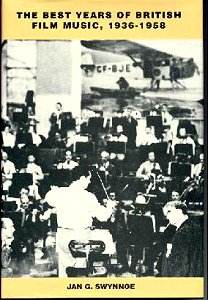It is true that some of the most memorable British
film scores were written by many of our leading composers in the period
1936 to 1958. One thinks immediately of beacon scores like: Bliss’s
Things To Come, Vaughan Williams’ inspiring score for The
49th Parallel and his evocative Scott of the
Antarctic and Walton’s three Shakespearean scores: Henry V, Hamlet
and Richard III and his music for The First of the Few.
John Williams has observed that Walton was highly regarded by the American
film music fraternity.
Ms Swynnoe, who is described as a pianist, percussionist
and composer, looks at this period before the rise of the American quota
movies filmed in England and the advent of British kitchen-sink dramas
and before audiences deserted the cinemas in favour of cosy fireside
TV. Generally, she paints a bleak picture of the British film industry:
often, with a few notable and brilliant exceptions, producing films
debilitated by low budgets, and stilted and class-conscious stories
and buttoned-up acting. Music written for films, in those days (nothing
much has changed) was generally regarded by critics and the musical
establishment as inferior and often major British composers were dragged
reluctantly into the studios.
The difficulty I have with this book is that Ms Swynnoe
cannot resist parading her many prejudices and in doing so presents
a totally distorted picture of the world of film music. She disparages
Hollywood’s essential contribution, belittling the accomplishments of
Steiner and Korngold (with little or no mention of the other giants
of the Golden Age like Waxman, Tiomkin, and Herrmann etc), rubbishing
the over-use (?) of leitmotivs and the habit of mickey-mousing and general
lack of subtlety. Somehow I wonder if she has really troubled to listen
widely and study enough American film music of this period.
She practically dismisses all the music written for
the marvellous and colourful Korda films made at Denham in this period,
especially by Miklós Rózsa. She can find no merit in Rózsa’s
fine The Four Feathers music for example – although she scores
a small point when discussing its weakness as a support to non-action
dialogue scenes. Another target is the music contributed by foreign
composers. Georges Auric’s contribution is all but swept aside. To support
her often tenuous arguments, she quotes from sources that are too often
ill-informed or unsympathetic to film music, or both. But most objectionably
her selected negative quotes from Christopher Palmer’s brilliant book
The Composer in Hollywood gives a totally wrong impression of
Palmer’s work, which accentuated the strengths of Korngold and
Steiner etc. It is notable that Palmer was a great champion of not only
British film music but also the concert music of many British composers,
especially Walton and Delius and yet most of his work in the genre of
film music was orientated towards Hollywood. (My concluding remarks
below might suggest why.) Unhappily Swynnoe cannot resist diminishing
Palmer’s reputation in an interview with Doreen Carwithen that forms
Appendix II of this book.
The book’s only strength is in its analyses of a number
of British film scores well-known and not-so-well-known including such
excruciatingly awful minor opuses like Once a Jolly Swagman and
Waterloo Road. Swynnoe does make some valid points, useful for
aspiring film composers, about how music used with subtlety and discrimination
can enhance a screenplay particularly when intelligently used to support
dialogue especially when it needs to reveal a character’s feelings that
might be at odds with delivered lines. One of Swynnoe’s most interesting
examples in this context is Lord Berners’ music for the mystical ghost
story Halfway House. One chapter is devoted to an analysis of
the strengths and weaknesses of Sir Arnold Bax’s score for Oliver
Twist, not by any means representative of the composer’s best music.
It was written towards the end of Bax’s life when he was living in Sussex,
and when his best work was well behind him – in fact the only really
memorable theme from this film was lifted from one of his much earlier
works, In Memoriam.
Although the book is valuable in its discussion of
the practical aspects of film music in enhancing and clarifying screenplays,
Swynnoe seems uninterested in an important aspect of film music that
of its ability to stand apart and to be appreciated on its own merits
as music. And this is where I return to Christopher Palmer and the Hollywood
composers. I am going to stick my neck out here. Dare I say it, but
apart from the film scores quoted in my first paragraph and a few others
by Brian Easdale, Malcolm Arnold (and certainly not his Oscar-winning
score for The Bridge on the River Kwai, celebrated for that excruciatingly
awful Colonel Bogey March) and William Alwyn (who wrote a few fine scores
like Odd Man Out but too many others that are pedestrian), so
much of British film music is frankly dull. So little of it is memorable,
so little of it touches the heart and raises the spirit. American film
music of this period does so in spades and that is perhaps why Palmer
wrote about American film music first and collaborated in so many recordings
of the music of Hollywood’s Golden Age as a first choice. One has to
face the fact that there are far more recordings of American film music
than British.
This book does few favours for British films or British
film music. In fact it puts back the appreciation of film music in general
by years. Approach with caution.
Ian Lace


